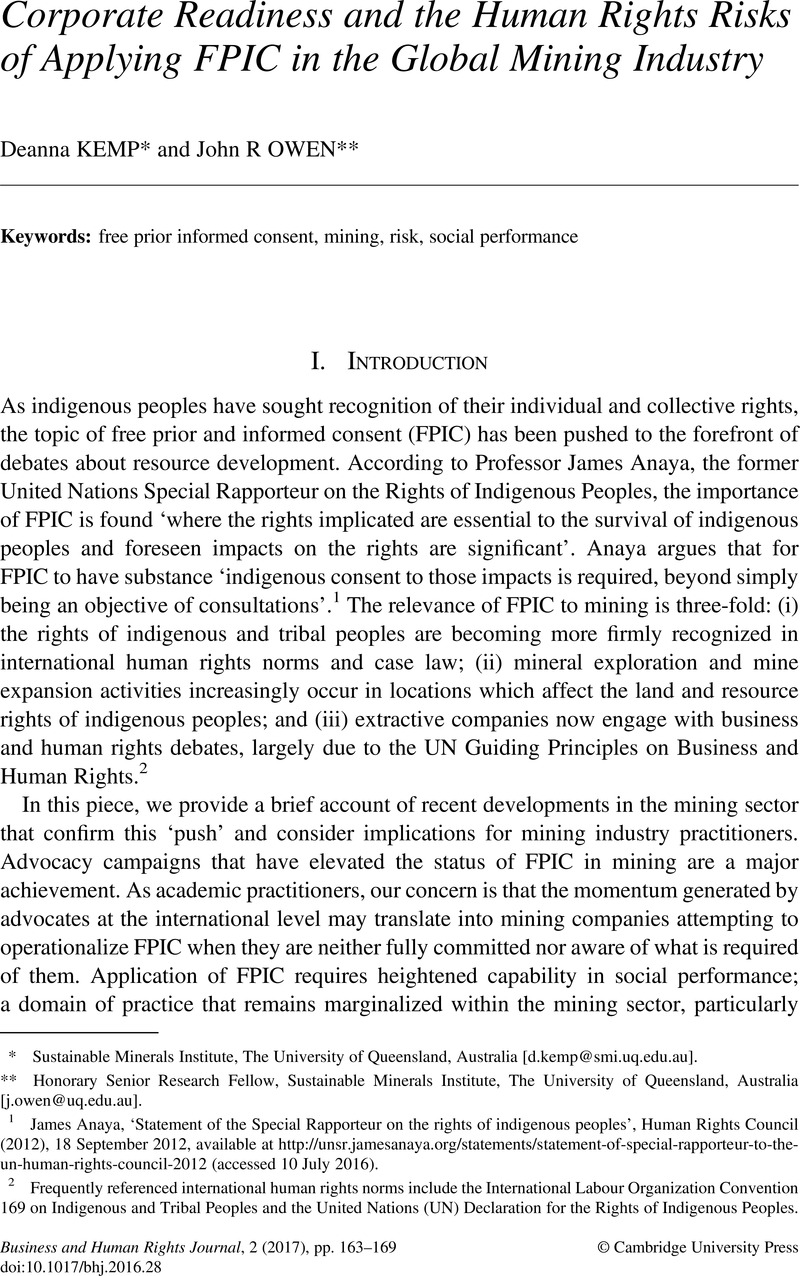Published online by Cambridge University Press: 05 December 2016

Sustainable Minerals Institute, The University of Queensland, Australia [[email protected]].
Honorary Senior Research Fellow, Sustainable Minerals Institute, The University of Queensland, Australia [[email protected]].
1 Anaya, James, ‘Statement of the Special Rapporteur on the rights of indigenous peoples’, Human Rights Council (2012), 18 September 2012, available at http://unsr.jamesanaya.org/statements/statement-of-special-rapporteur-to-the-un-human-rights-council-2012 Google Scholar (accessed 10 July 2016).
2 Frequently referenced international human rights norms include the International Labour Organization Convention 169 on Indigenous and Tribal Peoples and the United Nations (UN) Declaration for the Rights of Indigenous Peoples.
3 Kemp, Deanna and Owen, John, ‘Community Relations and Mining: Core to Business But Not “Core Business”’ (2013) 38 Resources Policy 523 CrossRefGoogle Scholar.
4 International Finance Corporation, ‘Performance Standard 7: Indigenous Peoples’, 1 January 2012, http://www.ifc.org/wps/wcm/connect/1ee7038049a79139b845faa8c6a8312a/PS7_English_2012.pdf?MOD=AJPERES (accessed 10 July 2016).
5 International Council on Mining and Metals, ‘Indigenous Peoples and Mining: Position Statement’, https://www.icmm.com/publications/icmm-position-statement-on-indigenous-peoples-and-mining (accessed 10 July 2016).
7 Initiative for Responsible Mining Assurance, The IRMA Standard, http://www.responsiblemining.net/irma-standard/irma-standard-draft-v2.0/ (accessed 10 July 2016).
8 Buxton, Abbi and Wilson, Emma, ‘FPIC and the Extractive Industries: A Guide to Applying the Spirit of Free, Prior and Informed Consent in Industrial Projects’, International Institute for Environment and Development (2013)Google Scholar, http://pubs.iied.org/pdfs/16530IIED.pdf (accessed 10 June 2016); Campbell, Jasmine, ‘Engaging with Free, Prior and Informed Consent’, Business for Social Responsibility (2012)Google Scholar, http://www.bsr.org/reports/BSR_Engaging_With_FPIC.pdf (accessed 5 June 2016); Lehr, Amy and Smith, Gare, ‘Implementing a Corporate Free, Prior, and Informed Consent Policy: Benefits and Challenges’, Foley Hoag (2010)Google Scholar, http://www.foleyhoag.com/publications/ebooks-and-white-papers/2010/may/implementing-a-corporate-free-prior-and-informed-consent-policy (accessed 3 June 2016).
9 See: http://pdf.wri.org/development_without_conflict_fpic.pdf (accessed 29 August 2016).
10 Owen, John and Kemp, Deanna, ‘Free Prior and Informed Consent, Social Complexity and the Mining Industry: Establishing a Knowledge Base’ (2013) 41 Resources Policy 91 CrossRefGoogle Scholar.
11 Native Title Act (Australia) (1993), http://www.austlii.edu.au/au/legis/cth/consol_act/nta1993147/ (accessed 10 July 2016).
12 Since 1998, Indigenous Land Use Agreements (ILUAs) have provided an alternative for native title groups seeking to negotiate with mining companies. This mechanism is available to groups that have not had native title determined.
13 Colchester, Marcus and Ferrari, Maurizio, ‘Making FPIC Work: Challenges and Prospects for Indigenous Peoples’, Forest Peoples Programme (2007), http://www.forestpeoples.org/sites/fpp/files/publication/2010/08/fpicsynthesisjun07eng.pdf Google Scholar (accessed 2 June 2016).
14 See also Macintyre, Martha, ‘Informed Consent and Mining Projects: A View from Papua New Guinea’, (2007) 80 Pacific Affairs 49 CrossRefGoogle Scholar.
15 Kemp, Deanna and Owen, John, ‘The reality of remedy in mining and community relations: an anonymous case-study from Southeast Asia’ in Mahdev Mohan and Cynthia Morel (eds.), Business and Human Rights in South East Asia: Risk and the Regulatory Turn (2015)Google Scholar.
16 In the case of resettlement, see, for example, Lillywhite, Serena, Kemp, Deanna, and Sturman, Kathryn, ‘Mining, Resettlement and Lost Livelihoods: Listening to the Voices of Resettled Communities in Mualadzi, Mozambique’, Oxfam (2015)Google Scholar, https://www.oxfam.org.au/wp-content/uploads/2015/04/mining-resettlement-and-lost-livelihoods_eng_web.pdf (accessed 10 July 2016).
17 James Anaya, ‘Report of the Special Rapporteur on the Rights of Indigenous Peoples: Extractive Industries Operating Within or Near Indigenous Territories’, Human Rights Council, (2011) Eighteenth Session, Agenda Item 3, A/HRC/18/35; James Anaya, ‘Report of the Special Rapporteur on the Rights of Indigenous Peoples: Extractive Industries and Indigenous Peoples’, Human Rights Council (2013), Twenty-fourth Session, Agenda Item 3, A/HRC/24/41.
18 Doohan, Kim, Making things good: relations between Aborigines and miners at Argyle (2008)Google Scholar; see also Doohan, Kim, Langton, Marcia, Mazel, Odette, ‘From Paternalism to Partnership: The Good Neighbour Agreement and the Argyle Diamond Mine Indigenous Land Use Agreement in Western Australia’ in Marcia Langton and Judy Longbottom (eds.), Community Futures, Legal Architecture: Foundations for Indigenous Peoples in the Global Mining Boom (2012)Google Scholar.
19 Deanna Kemp, Sandy Worden, and John Owen, ‘Differentiated social risk: Rebound dynamics and sustainability performance in mining’ (forthcoming).
20 Catherine Coumans and Patricia Feeney, ‘Privatized Remedy and Human Rights: Re-thinking Project-Level Grievance Mechanisms’, Third Annual UN Forum on Business and Human Rights (2014), http://accessfacility.org/sites/default/files/MiningWatch%20Canada%20%26%20RAID%20-%20Privatized%20Remedy%20and%20Human%20Rights%3B%20Re-thinking%20Project-Level%20Grievance%20Mechanisms.pdf (accessed 10 July 2016).